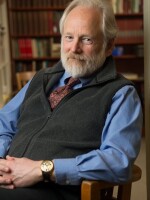Tod Machover may not yet be a household name, but give him time. A composer, computer scientist, and all-round futurist at MIT’s Media Lab, Machover is the central figure in Opera of the Future, an ambitious effort to, as he puts it, “humanize technology and make technology, especially in music, be an extension of human gesture.”
Machover’s most successful effort to do that, so far, is “ Death and the Powers”, a truly original work that premiered in 2010, won a Pulitzer Prize nomination, and was recently presented by the Dallas Opera in what producers called a “global interactive simulcast.”
Death and the Powers is about Simon Powers, a billionaire inventor who decides he’s not keen on dying and uploads himself into a computerized “system” permitting him to exist forever. His heirs and others must contend with the continuing phenomenon of having Powers both there and not there simultaneously.
It’s an ingenious plot, made all the more so by libretto by three-time Poet Laureate Robert Pinsky. But to me the interest lies in the technology itself.
About half of the cast are robots – or “Operabots” as they’re known at MIT – that sing, dance and generally make themselves stars of the show. At a rehearsal, one of the robot handlers confided to PBS reporter Jeffrey Brown that they exhibited human quirks – one of which, unfortunately, seemed to be stage fright. The Dallas production was simulcast to locations in Europe and the U. S. where members of the audience could interact with the on-stage action. Using cell phones, tablets, and other tools, people went beyond mere viewing to experience the event from Powers’s perspective and from that of the robots.
Genius or gimmick? It reminds me of Dr. Johnson’s famous comment about a dog walking on its hind legs: “It is not done well; but you are surprised to find it done at all.” Machover and his group do their work exceedingly well, but in the end I’m distrustful of something that is at bottom a demonstration of technical competence – dazzlingly so, but still mechanical. When I go to the theater or a ball game, or anything that involves watching extraordinary human endeavor, it’s the humanness I come to witness. The fascination lies in watching highly talented people attempt to perform extraordinarily difficult actions, which we and they know might not come off. It’s the striving that we care about and the possibility of failure that gives such an edge to a performance. I’m not sure that we’d derive the same pleasure and emotional satisfaction watching a Robot Red Sox, say, or a Cyborg slopestyle competition.
On the other hand, the notion of someday sitting in Vermont and experiencing a simulcast opera from the point of view of a robot? That’s pretty cool.





